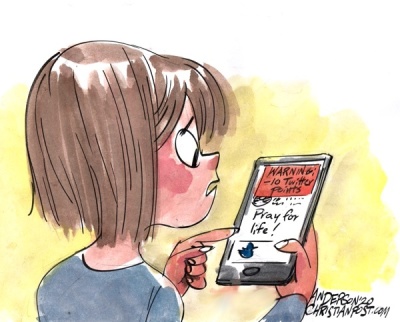Big abortion’s big tech allies aim to censor pro-lifers. They won’t win.

The future of abortion law in the U.S. hinges on the forthcoming ruling in a Supreme Court case, Dobbs v. Jackson Women’s Health Organization, but the pro-life movement must begin gearing up to fight another insidious foe — Big Tech censorship.
Organizations standing for the sanctity of life are well aware of the uphill battle they face.
The prominent anti-abortion group Live Action had its content censored online long before the docket put the Supreme Court’s 1973 Roe v. Wade ruling legalizing abortion nationwide in the crosshairs.
In 2019, social media platform Pinterest added Live Action’s website to its blacklist of banned sites. The blacklisting meant users were unable to link to Live Action’s content or post it on Pinterest.
The Daily Signal reported that after Live Action attempted to appeal the ban, Pinterest took things a step further and permanently banned its account, claiming the organization violated Pinterest’s misinformation policies.
Andrew Moore, digital and creative director at pro-life group Susan B. Anthony List, says that his organization also has been hit by Big Tech censorship on several occasions.
“In 2017, Twitter prevented SBA List from running an ad featuring a pro-life quote by Mother Teresa, claiming our ad violated their policy on promoting the sale of health and pharmaceutical products,” Moore said in a statement to The Daily Signal.
“In 2020, citing a factually incorrect ‘fact-check’ by the Dispatch, Facebook banned our ads stating that Joe Biden and Kamala Harris support late-term abortion. Meanwhile, Big Abortion was permitted to run comparable ads without any restrictions.”
The examples of Big Tech censorship of pro-life causes are innumerable. But what it all leads back to is that Big Tech is hostile to the anti-abortion movement and has openly thrown its considerable weight behind leftist pro-abortion causes.
That isn’t really shocking. It’s an open secret that platforms such as Facebook, Google, and Twitter are run by leftists whose sensibilities align more with rabid pro-abortionists.
Where this is likely to become an issue is when pro-abortion activists and their kindred spirits in the Silicon Valley hubs of Big Tech see Roe pared back or even struck down by the high court. A ruling is expected in late June.
The doomsaying surrounding a possible end to Roe already has the far left reeling. It’s not hard to imagine a scenario in which the tech titans would push even harder to censor dissenting voices seeking to end or restrict abortion across the country.
Moore says Susan B. Anthony List is expecting a new wave of censorship.
“We are prepared for a crackdown on any messaging on abortion that does not fit the narrative of Planned Parenthood and their numerous allies in Silicon Valley,” he said, adding:
If the Supreme Court hands the question of abortion back to the people through their legislatures, Big Abortion will stand to have everything to lose. This new reality will motivate their friends in Big Tech to enact even more draconian measures.
As a silver lining, pro-life conservatives are at least aware that censorship will occur and have time to prepare. Pro-abortion forces already have shown their hand, so the pro-life movement knows what to expect if Roe is struck down.
Conservatives should demand transparency and accountability from Big Tech companies that censor them. The tech titans shouldn’t have the power to hide behind shadowy algorithms and selective enforcement as they repeatedly remove pro-life content.
Recent bills in Georgia and Florida provide a model for consumer protections at the state level. The Georgia legislation has a provision under which Big Tech companies would be forced to provide a report on how frequently they censor content and why they took action. That would give users proof that they’d been censored.
But even if the online gatekeepers prevent pro-life messages from reaching a digital audience, pro-lifers can still take the movement offline.
“If Big Tech increases their censorship of pro-life speech in a post-Roe America, pro-life Americans must step up by fostering person-to-person communications, through word of mouth, email, text, and alternative messaging, and social media platforms that have more respect for freedom of speech,” Moore said.
The biggest pro-life event each year is the March for Life. Tens of thousands of Americans dedicated to protecting the unborn gather each year in Washington, D.C., to make it clear that life matters.
As it becomes more likely Roe will be struck down, or at least curtailed, the March for Life has begun spinning off marches in states such as Connecticut and California. Pro-life conservatives should attend these marches and organize their own, free from the censoring power of Big Tech.
The radical left will use every trick it has to keep abortion unrestricted, but the pro-life movement ultimately will win. Big Tech can try, but life won’t be censored.
Originally published at The Daily Signal.
Douglas Blair is a contributor to The Daily Signal and a graduate of Heritage's Young Leaders Program.




















